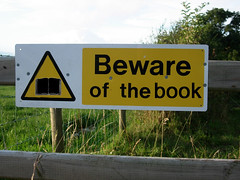 In the September 25, 2009, edition of The Wall Street Journal, Mitchell Muncy discussed the American Library Association's Banned Books Week (which began last Saturday) and the decree to which censorship exists in America. Excerpts:
In the September 25, 2009, edition of The Wall Street Journal, Mitchell Muncy discussed the American Library Association's Banned Books Week (which began last Saturday) and the decree to which censorship exists in America. Excerpts: In the common-law tradition, censorship refers specifically to the government's prior restraint on publication. None of the sponsors claim this has happened; the acts they have in mind are perpetrated by private citizens. Yet the cases on the map almost all involve ordinary people lodging complaints with school and library authorities. Before Banned Books Week began in 1982, such behavior was known as petitioning the government for a redress of grievances.Read the whole thing. Though Muncy sweeps aside concerns about "every book [being] immediately available everywhere on request," this seems to be exactly the point that supporters of BBW harp on. Neil Gaiman himself lampooned the above op-ed, summarizing it on his blog as claiming that "after all, if you're a kid and a book that somebody's parents didn't want any of you to read is removed from your school library, it's not really banned: you have the freedom to save up your pocket money and go out to the well-stocked bookshops you can somehow find in every American small town and buy a copy for yourself."
The problem of loose language aside, we can still ask whether books are banned in this country. The obvious answer is no, if banned means something like "made dangerous or difficult for the average person to obtain." Many books that have drawn critics' attention have been best sellers (the Harry Potter books and Philip Pullman's "His Dark Materials" trilogy), classics ("The Adventures of Huckleberry Finn" and "To Kill a Mockingbird"), or the work of acclaimed authors (Toni Morrison and Margaret Atwood). If a book isn't available at one library or bookstore, it's certainly available at another. Not even the most committed civil libertarian demands that every book be immediately available everywhere on request -- though in the age of Amazon that's nearly the case.
But here's the rub in this evaluation: Such challenges truly aren't censorship, either in a de jure or de facto sense. Controversial books might not be as available as proponents would like, but (let's face it) we have greater access to such titles than at any point in history. The problem is one of scarcity rather than censorship, and even that is increasingly minimized by free-to-play book sites such as PaperbackSwap.com. Though including the word "banned" in a literary event's title may be good marketing, it ultimately cheapens the struggle of individuals who live in countries where procuring a copy of Lolita or the New Testament may result in death.
(Picture: CC 2005 by florian.b)


8 comments:
Loren, thanks for posting this. It's been on my mind ever since the Scroggins debacle. I think he came off as sounding incredibly ignorant and I disagree to some extent with virtually everything he said in his editorial. However misplaced and offensive his comments were, they did not amount to censorship, particularly since his call for parents to become more aware and involved in the books their schools are providing.
My hope is that parents would respond to that call by saying, "Hey, Scroggy ol' pal ol' chum, we actually read those books and they're nothing like what you describe, so we think they stay."
Alas, I'm afraid I don't know a think about Scroggins. Enlighten me, good sir!
Sure thing! Here's the original Scroggins post: http://bit.ly/99mAzh
There has been a huge outcry on behalf of speak, much of which is gathered at http://speakloudly.org/
Here is an example post: http://bit.ly/9a1JLb
Very well said, Loren.
This "banned books" absurdity has been an irritant to me for years.
Nevets,
No wonder that caused a firestorm. Any time you start dealing with curricula, tempers are going to get heated. But you're right: Scroggins isn't advocating censorship at all.
S.D.,
Me, too. Honestly, comparing a parent's desire to remove Mark Twain from a public library with being caught with (oh, I dunno) any book of which the leadership of Tehran doesn't approve strikes me as a major misapprehension of reality.
Loren, yeah, the guy's a schmoe, and I'm not sure he's read the books he's challenging but schmoes have a right to be schmoes. We have a right (and maybe as educated people a responsibility) to speak up and correct the record on the content of the books, advocate a wiser and more responsible approach, etc. -- but I don't think we need to flame the emotional bonfire by throwing the word censorship.
(Which, as you said, also dilutes the meaning of the word for those situations in which it really is going on.)
Post a Comment